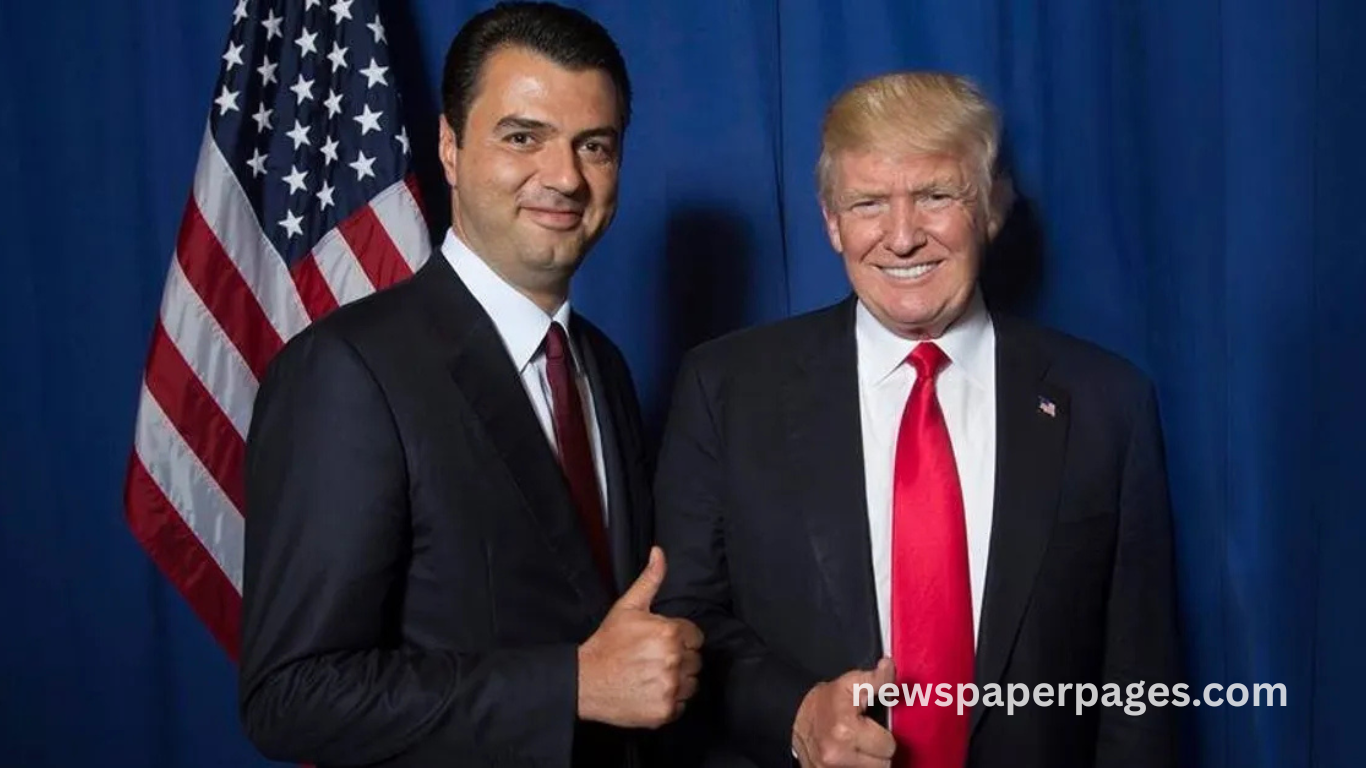In a political twist that has captured both intrigue and skepticism, Chris LaCivita—the seasoned Republican strategist best known for managing Donald Trump’s 2024 presidential campaign—is rumored to be shifting focus to an unexpected arena: Albania. As Balkan politics grapple with modernization, corruption, and EU integration, LaCivita’s entry into the Albanian political sphere signals a bold strategy modeled after the combative, populist tactics that redefined American conservatism.
Reports suggest that LaCivita’s involvement in Albania revolves around advising opposition leaders eager to disrupt the establishment and resonate with everyday citizens. While some hail this as a chance for revitalization, critics warn of imported polarization. Still, the very idea of applying “Make America Great Again” playbooks in Eastern Europe is enough to stir global headlines. What does LaCivita see in Albania, and what might this next act mean for the country’s democratic journey?
Chris LaCivita’s Political Legacy and MAGA Playbook
Chris LaCivita’s reputation in American politics is one of sharp messaging, fierce loyalty, and relentless strategy. He played a pivotal role in orchestrating Trump’s 2024 campaign, using nationalist rhetoric, media manipulation, and voter mobilization to reshape conservative platforms. His tactics hinge on identity politics, grassroots energy, and simplifying complex national issues into digestible, emotionally charged slogans.
In Albania, these techniques could provide opposition parties with a newfound sense of direction. The MAGA playbook, once considered uniquely American, may now become a template for right-leaning populist movements worldwide, with LaCivita as its most prominent evangelist.
Why Albania? Strategic Importance and Political Opportunity
Albania, a NATO member with EU aspirations, sits at a geopolitical crossroads. In recent years, frustration has grown over corruption, unemployment, and political stagnation. This atmosphere is fertile ground for a populist resurgence. Albania’s young population, increasing digital connectivity, and dissatisfaction with current leadership make it a strategic testing ground for a fresh political message.
LaCivita’s interest could also be fueled by transatlantic connections. As the Balkans face growing influence from China, Russia, and Turkey, pro-Western political realignment offers a chance for American operatives to shape the narrative.
Rebranding the Albanian Opposition with Populist Tactics
Opposition parties in Albania have long struggled with fragmentation and credibility. By introducing messaging discipline and charismatic leadership, LaCivita aims to consolidate dissent under a single, powerful banner. Expect slogans akin to “Make Albania Great Again,” rallies filled with patriotic fervor, and messaging that simplifies governance challenges into moral or cultural issues.
Read More : U.S. Advances Toward China in Hypersonic Weapons Race
These tactics seek to create an emotional connection with citizens who feel abandoned by elites. LaCivita’s style relies less on policy substance and more on political theater, making it particularly effective in volatile democracies.
The Role of Social Media and Digital Warfare
In Trump’s campaigns, LaCivita exploited social media to bypass traditional news filters and speak directly to supporters. In Albania, where internet penetration and social media usage are high among youth, a similar digital-first strategy can rapidly build movements.
Expect an increase in targeted memes, viral videos, and influencer-style political messaging. This form of digital warfare reshapes narratives faster than traditional journalism can verify them—an edge that populist movements have used to tremendous effect globally.
International Reactions and Regional Tensions
LaCivita’s involvement in Albania won’t go unnoticed by the EU, neighboring countries, or geopolitical observers. European leaders may view his entry as a destabilizing move that mirrors the rise of right-wing populism elsewhere in Eastern Europe. Meanwhile, Serbia, Greece, and Kosovo will monitor any nationalistic rhetoric with caution.
Depending on how the Albanian public responds, this international scrutiny could either constrain LaCivita’s ambitions or embolden them. Foreign policy elites must prepare for a potentially dramatic shift in how Albania positions itself diplomatically and ideologically.
Concerns About Imported American Political Polarization
Bringing LaCivita’s tactics into Albania raises significant concerns about political polarization. While populism can invigorate democracy by mobilizing the disenfranchised, it can also deepen divisions, erode institutional trust, and legitimize authoritarian tendencies under the guise of “anti-elitism.”
Observers worry that exporting MAGA-style politics could create echo chambers, amplify misinformation, and undermine constructive political discourse. If LaCivita’s presence prioritizes spectacle over substance, Albania’s already fragile democratic institutions may face unprecedented stress.
Opportunities for Democratic Engagement and Reform
Despite the risks, LaCivita’s playbook could rejuvenate public interest in politics. In a nation where voter apathy and skepticism toward government are rampant, energizing citizens through clear messaging and direct engagement could have positive effects.
If used responsibly, these strategies might inspire a new generation of activists and reformers. The challenge lies in balancing passion with policy, ensuring that enthusiasm does not devolve into extremism or manipulation.
Will LaCivita Seek Long-Term Influence in the Balkans?
There’s growing speculation that Albania could be just the beginning. LaCivita’s brand of populism could be adapted for neighboring nations with similar grievances. Montenegro, North Macedonia, and Bosnia and Herzegovina face comparable frustrations over corruption and EU delays, offering fertile ground for political transformation.
If LaCivita succeeds in Albania, his role may expand to that of a regional advisor, shaping Balkan politics for years to come. This would solidify his legacy not just as a U.S. political operative, but as a transnational architect of 21st-century populism.
Frequently Asked Questions
Who is Chris LaCivita?
Chris LaCivita is an American political strategist who managed Donald Trump’s 2024 campaign and advised various Republican campaigns across the U.S.
Why is Chris LaCivita interested in Albania?
He sees Albania as a ripe opportunity for populist political strategies, with a frustrated electorate and strategic geopolitical importance in the Balkans.
What does “Make Albania Great Again” mean?
It is a localized adaptation of Trump’s famous slogan, aiming to revive national pride and challenge entrenched political elites in Albania.
How could LaCivita influence Albanian politics?
By advising opposition parties, refining political messaging, and launching social media campaigns to energize the electorate and unify dissenting voices.
Is LaCivita officially working with any Albanian party?
No formal affiliations have been confirmed publicly yet, but insider reports suggest quiet collaborations with leading opposition figures.
What are the risks of adopting MAGA-style politics in Albania?
The biggest risks include increased political polarization, misinformation, and weakening democratic institutions through divisive, emotional rhetoric.
How are international communities reacting to this development?
EU leaders and Balkan neighbors are growing concerned about the potential destabilizing effects of American-style populism in the region.
Could this trend spread to other Balkan countries?
Yes, if LaCivita’s strategy proves successful in Albania, similar populist movements could gain traction in other politically volatile Balkan nations.
Conclusion
Chris LaCivita’s rumored venture into Albanian politics reflects a fascinating convergence of American-style populism and Balkan political opportunity. While the “Make Albania Great Again” narrative holds potential to energize voters and disrupt status quos, it also carries risks of deepening polarization. As Albania stands at a crossroads, the world watches whether LaCivita’s tactics will empower a democratic revival—or ignite a divisive firestorm. Stay informed, and critically assess who shapes your nation’s future.

